

Skills learnt through cooking - Seriously Kids. The more opportunities for kids to learn through doing the better for their learning outcomes.
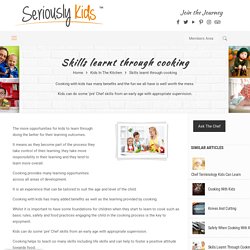
It means as they become part of the process they take control of their learning, they take more responsibility in their learning and they tend to learn more overall. Cooking provides many learning opportunities across all areas of development. It is an experience that can be tailored to suit the age and level of the child. Cooking with kids has many added benefits as well as the learning provided by cooking. Cooking With Preschoolers (for Parents) - Nemours KidsHealth. Cooking can help young kids learn and practice some basic math concepts and build language skills.
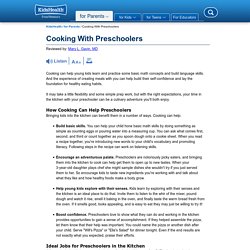
And the experience of creating meals with you can help build their self-confidence and lay the foundation for healthy eating habits. It may take a little flexibility and some simple prep work, but with the right expectations, your time in the kitchen with your preschooler can be a culinary adventure you'll both enjoy. How cooking helps children’s emotional development. The kitchen is a great place for children to try new things, explore and develop a whole raft of skills without external pressure and influences.
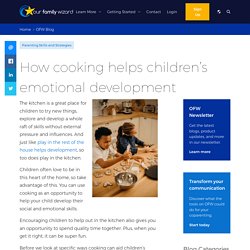
And just like play in the rest of the house helps development, so too does play in the kitchen. Children often love to be in this heart of the home, so take advantage of this. You can use cooking as an opportunity to help your child develop their social and emotional skills. Encouraging children to help out in the kitchen also gives you an opportunity to spend quality time together. Plus, when you get it right, it can be super fun. Vegetables: encouraging kids to eat vegies. Why eating vegetables is important for children Vegetables give your child energy, vitamins, anti-oxidants, fibre and water.
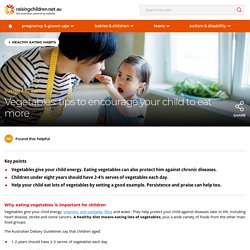
They help protect your child against diseases later in life, including heart disease, stroke and some cancers. A healthy diet means eating lots of vegetables, plus a wide variety of foods from the other main food groups. The Australian Dietary Guidelines say that children aged: 1-2 years should have 2-3 serves of vegetables each day2-3 years should have 2½ serves of vegetables each day4-8 years should have 4½ serves of vegetables each day.
If your child finds it hard to eat enough vegetables, it’s important to keep working on it. Our tips below can help you get more vegetables into your family’s diet. Makingmostofchildhood. Learning through play (early childhood development) ✎ Theirworld. Time to cook is a luxury many families just don't have. Getting a healthy meal on the table each night is a challenge for many parents.

Have Americans forgotten how to cook? Many lament the fact that Americans spend less time cooking than they did in previous generations. Whereas women spent nearly two hours a day in the kitchen in 1965, they spent a little less than an hour preparing meals in 2016. Men are cooking more than they used to, but still only cook 20 minutes a day. In a 2014 TED Talk, which has more than 8 million views, British chef and food celebrity Jamie Oliver paces the stage, lecturing the audience about the amount of processed food people in the United States consume.
Oliver and other food reformers believe that the time is there to cook, if only people would get their priorities straight. But telling families to better manage their time is not likely to solve the cooking struggles American families face. Unpredictable work schedules Americans’ work lives are increasingly unpredictable and hectic. Expensive shortcuts. Azph12249. 20 valuable benefits of cooking with toddlers. Do you cook with your toddlers?
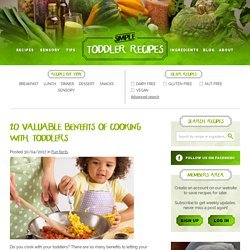
There are so many benefits to letting your children help out in the kitchen. They learn, develop and enjoy themselves so much. Fussy eaters in the family? Tips to help. About fussy eating and fussy eaters It’s normal for children to be fussy eaters – that is, to not like the taste, shape, colour or texture of particular foods.
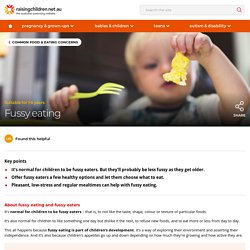
It’s also normal for children to like something one day but dislike it the next, to refuse new foods, and to eat more or less from day to day. This all happens because fussy eating is part of children’s development. It’s a way of exploring their environment and asserting their independence. Children Learning through Cooking (Part 1) In our previous posts on Children’s Nutrition and Healthy Eating Part I and Part II, we shared tips and strategies to encourage healthy eating habits in young children.
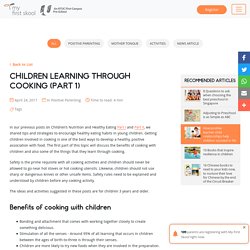
Getting children involved in cooking is one of the best ways to develop a healthy, positive association with food. The first part of this topic will discuss the benefits of cooking with children and also some of the things that they learn through cooking. Safety is the prime requisite with all cooking activities and children should never be allowed to go near hot stoves or hot cooking utensils. Likewise, children should not use sharp or dangerous knives or other unsafe items. Cooking With Preschoolers (for Parents) - Nemours KidsHealth. Kids - Sprout. School Programs - Sprout. About — Itsy Bitsy Chef. Chef Deanne.
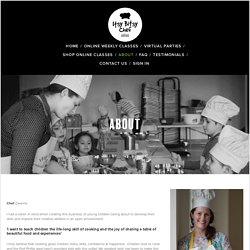
How cooking helps your kids stay healthy and learn. If you're schooling your children at home, chances are you're very time-poor.
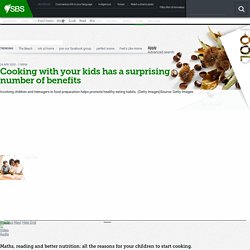
By teaching your children to cook, you could bundle up some learning while also getting dinner or lunch prepared. Teaching children to cook healthy food helps them gain knowledge and skills across a range of subjects simultaneously. The bonus is, you could get a healthy meal prepared as well. By focusing on nutritious recipes you'll also address personal development, health and physical education topics. Getting childen in the kitchen has a lifetime payoff for health. Life-style, life, cooking, kids, kitchen, covid-19, social, isolation, hobbies, lifestyle It's not just adults being inspired to get into the kitchen during social isolation.
Kids are also pulling out the oven mitts and wielding the whisks. Cooking with kids is an invaluable way to not only give them an enjoyable distraction but to teach important lessons around health and nutrition. Besides having some fun, there are other benefits to cooking at home with children, Western NSW Local Health District health promotion officer Emma Fitzgerald said. "These include learning to read, follow and interpret a set of instructions (the recipe), measuring ingredients and performing simple maths, learning about hygiene and safety rules in the kitchen, and how to work in a team," she said. It's not just adults being inspired to get into the kitchen during social isolation. 7 Ways Children Learn Through Cooking. When it comes to discovery and adventure at home, one room stands apart as an enticing and delicious wonderland where your child can contribute and feel grown up. “Most children love to help in the kitchen, and can start as early as age two,” notes Nicole Spain, Registered Dietitian Nutritionist at Tutor Time.
“It’s a terrific way to encourage healthy eating habits while you bond with your child and create lasting memories.” If the prospect of messy meal-making gives you pause, consider that cooking with you is among the best ways for your children to develop skills they’ll use for the rest of their lives. The Benefits of Cooking with Kids - Healthy Little Foodies. 5 Ways Cooking Can Nurture Children’s Development - Practical Outcomes. Benefits of cooking with preschoolers. The Importance of Allowing Children to Feed Themselves. Note: This is an often touchy subject for parents. There are many cultural influences that change the way feeding and self-feeding are approached by parents. Let babies be in charge of how much they eat – it could help them stay a healthy weight.
How babies are fed is often a topic of hot discussion. It’s known that babies should be introduced gradually to solid foods at around six months old. But in recent years, another question has arisen: should parents be spoon-feeding babies special pureed baby foods or could they just join in with the family and feed themselves from the very start? Known as baby-led weaning, parents who follow the method believe it has lots of benefits for their baby, such as encouraging them to eat a range of foods and stay a healthy weight. Maths, reading and better nutrition: all the reasons to cook with your kids. If you’re schooling your children at home, chances are that you’re very time poor.
The Benefits of Cooking in Early Childhood Education. Kids in the Kitchen: The Benefits of Cooking with Children. Conscientious parents are always on the lookout for ways to better teach, communicate, and connect with their children. Benefits of Getting Kids Involved in the Kitchen. Getting dinner on the table is a major feat in every busy family. However, before you ban your kids from the kitchen so you can cook in peace, invite them to help with the cooking. Australia's children, Overweight and obesity. Key findings In 2017–18, around 1 in 4 (24%) children aged 5–14 were overweight (17%) or obese (7.7%).
The proportion of children overweight or obese remained relatively stable between 2007–08 (23%) and 2017–18 (24%).